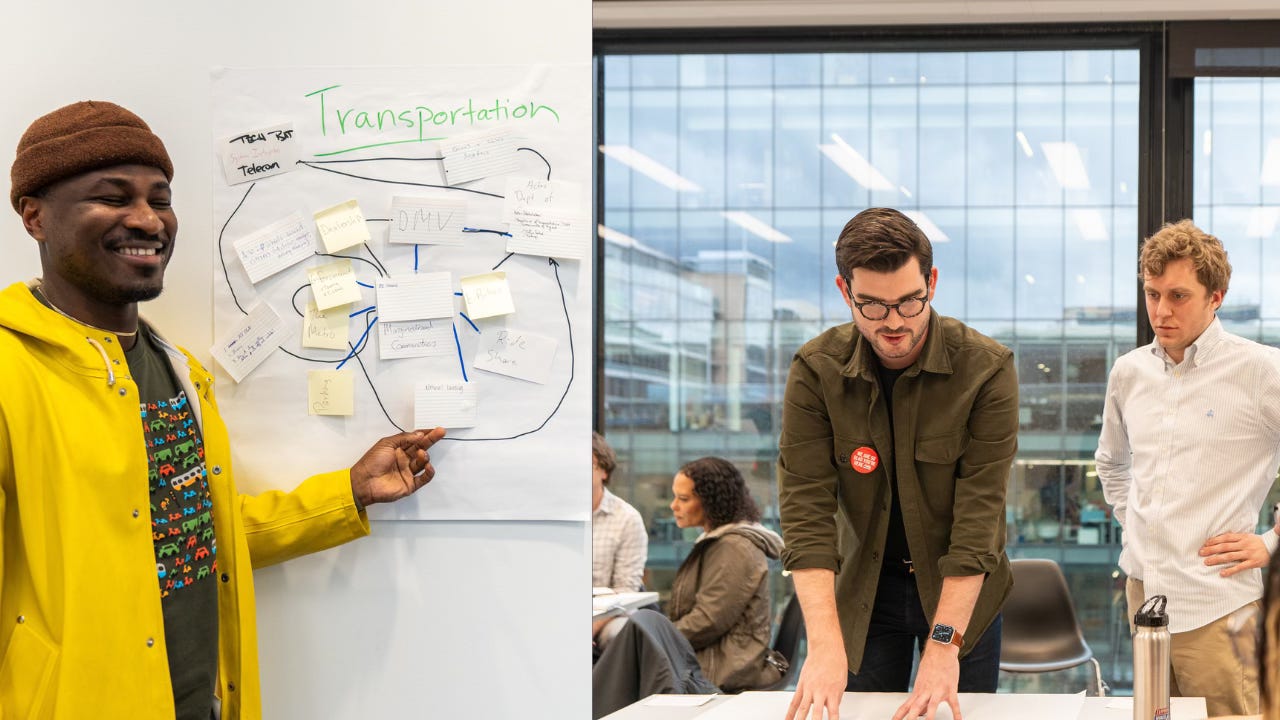Fruitful Futures & Moneyless Dreams
Ditching dollars, planting abundance, and reimagining wealth in a city where food grows on trees.
Sup neighbors, let's talk about something wild—living without money. Man, this one feels like a mind-fuck. As someone who grew up in one of the poorest parts of the world, i’ve always had an unhealthy relationship with money. I’ve imagined the world without money plenty of times over. I’m wondering if you have too — literately no dollars, no credit cards, no Venmo requests from that one friend who always forgets their wallet. Just bartering, sharing, and straight-up rejecting the economic system we all take for granted.
There’s this woman out in the UK who’s been living like this for years. No bank account, no salary, and somehow, she feels more secure than when she had a paycheck. I’m wondering if she’s a time traveler from a post-capitalist solarpunk utopia lol. Or just taking things a bit too far? Let’s break it down…
The Moneyless Dream vs. UBI
Now, this got me thinking—is living without money too extreme, or are we just conditioned to believe it's impossible?
On one hand, there’s something undeniably punk about rejecting the entire monetary system. It’s like saying, “Nah, I’m good” to capitalism itself. She gets her food from food waste programs, volunteers in exchange for shelter, and swaps goods and services instead of buying them. It’s radical, but in a way, it’s also kinda brilliant.
But let’s be real, not everyone can just drop out of the economy. Some of us have student loans, medical bills, or, you know, a thing for oat milk lattes lmao! That’s where Universal Basic Income (UBI) comes in. Imagine a solarpunk future where everyone gets a set amount of money each month, just for existing. Enough to cover the basics, so we’re free to focus on things that actually matter—community, sustainability, and figuring out how to turn every street into a green oasis.
Would we even need jobs in the traditional sense anymore? Maybe we'd all be out there building urban farms, upcycling old tech, and trading skills like some futuristic, eco-friendly RPG.
But What About Bitcoin?
Okay, so what if we don’t kill money, but we change how it works? Enter: Bitcoin and decentralized finance (DeFi).
Bitcoin isn’t just some digital gold for tech bros—it’s the blueprint for a world where no one controls the money but the people. No inflation, no middlemen, no government telling you what you can and can’t buy. Sounds pretty solarpunk, right? The problem is, crypto right now is mostly being used for speculation. We need to reclaim it as a tool for the people—for mutual aid, direct peer-to-peer trade, and local economies that don’t rely on the whims of Wall Street.
Imagine your local farmers’ market running on blockchain. No banks, no fees, just you trading directly with your neighbors using an energy-efficient digital currency that aligns with your values. That’s the kind of financial system I want in my solarpunk future.
The SolarPunk Future of Money
So, what’s the move? Do we go full moneyless like our British friend? Do we push for UBI? Do we just start using Bitcoin for everything and hope Elon Musk doesn’t ruin it?
Here’s my take: a hybrid system.
- Community-driven economies—time banks, barter networks, and shared resources.
- A redefined currency—whether it’s a local credit system, a solarpunk blockchain, or just digital cooperatives that keep money in the community.
- UBI as a safety net, so no one’s struggling to meet basic needs.
And most importantly, we break the idea that work = worth. Your value isn’t tied to your productivity. Whether you’re building solar panels, teaching kids to garden, or just vibing in a community space, you deserve to thrive.
Final Thought
Money, or no money? That’s the question. But what if the real answer isn’t choosing one or the other—it’s building a financial system that actually serves people and the planet, instead of exploiting them?
What do you think? Would you ditch money if you could? Would you be down for a solarpunk economy where wealth isn’t measured in dollars, but in community, sustainability, and good vibes?
Alright, I know I reference back home a lot— but back home in Liberia, food security wasn’t a fancy policy term—it was just how we lived. Between breakfast in the morning and dinner at night, we were never truly hungry because the land provided. Mango trees lined the roads, papayas hung heavy with fruit, coconuts were cracked open for a quick drink, and sugarcane stood tall, ready to be chewed on for an energy boost. The city itself was an extension of our pantry 😋🍍
Now, fast forward to Washington, D.C., where fruit trees are a rare sight, and the idea of picking food from public land is almost unheard of. Why is that? Why are cities designed to make you buy everything instead of grow anything?
Why Don’t Cities Want Free Food?
1. The “Mess” Excuse
Oh no, a peach fell on the ground! Guess we can’t have fruit trees, right? Meanwhile, the sidewalks are covered in fast-food wrappers and plastic bottles. Make it make sense! If we can clean up Starbucks cups every morning, we can clean up some fallen apples.
2. “Infrastructure” Gets in the Way
City planners will tell you that fruit trees don’t work because of underground pipes, sidewalks, and, I dunno, the alignment of the planets or some nonsense. But we figured out how to build skyscrapers and multi-level highways—you're telling me we can’t plant a couple of damn fig trees?
3. Fear of Lawsuits
The real villain in every urban design meeting: liability concerns. Someone could slip on a banana peel and sue the city, so instead of fixing the sidewalk cracks or designing better cleanup systems, they just say “Nah, no free food for you.” It’s ridiculous.
4. Capitalism Hates Free Stuff
Let’s be real: the food system is built to make sure you pay for what you eat. Grocery stores, food delivery, and big agriculture don’t want a world where people just grab lunch off a tree. But let’s call that what it is—a scam.
Solarpunk Cities Should Be FULL of Fruit Trees
Now, imagine a solarpunk version of D.C. Instead of barren streets and sad patches of grass, we’ve got fruit trees everywhere. You grab a peach on your way to the Metro. Kids snack on fresh oranges instead of processed junk. The air smells like actual nature instead of car exhaust and overpriced lattes. Danm I freaking can’t drink another sugar filled F&*king Starbucks latte y’all. love doing work there though..
But here’s the thing — it’s not just about free food. Fruit trees would:
- Fight food insecurity – No one should be hungry in a city with trees.
- Help the environment – More trees = less heat, better air, and more climate resilience.
- Build community – Nothing brings people together like free food and shade on a hot day.
- Break the system – A city that feeds itself? That’s a threat to the status quo.
This Ain’t Just a Dream—It’s Happening
Some cities are already waking up to this. Seattle’s got a public food forest, and places like San Francisco are planting fruit trees in parks. D.C.? We could do it too—fig trees along the Anacostia, citrus in every neighborhood, apples in underused green spaces.
So what’s stopping us? Nothing but bad policies and outdated thinking. Let’s get loud about this. Let’s plant trees ourselves if we have to. Because food should be a right, not a privilege.
And next time you’re hungry walking down the street, just remember—somewhere in the world, a kid is grabbing a mango off a tree, because that’s how it should be.
Solarpunk DC Gets Inspired at the Ecosystem Mapping Workshop 🌿🔋
Last week, we had the pleasure of attending an Ecosystem Mapping Workshop hosted by Threshold at the Smart Cities Meetup. And let me tell you, fam—it got the wheels turning in ways we didn’t expect!
The session was all about mapping out how different stakeholders—founders, policymakers, and ecosystem builders—fit together to create the kind of thriving, sustainable, and equitable cities we dream about. While the workshop didn’t specifically cover money or fruit trees (missed opportunity, if you ask me 🤑🍏), it still sparked some thoughts about how our local economy, transit, and community spaces intersect in the solarpunk future we’re pushing for.
Here’s what’s been on my mind since the event:
The DMV’s sustainability game is leveling up—whether it’s the $150M Virginia just got for climate projects, the rise of circular economy initiatives, or DC’s embrace of micro-mobility and transit equity.
The power of community-driven innovation—projects like City Blossoms’ kid-run gardens and DC’s network of urban farms prove that we don’t need to wait on top-down solutions.
The massive energy demand of Data Center Alley—and whether Virginia can truly decarbonize while still fueling its internet-driven economy.
We’re riding the solarpunk wave—come catch it with us. 🌱🌍⚡







I just saw this short on YouTube and the lady mentioned living off the land. It reminded me of this excerpt. Also, in honor of Black History month (and if you like cooking videos), I think this link would be great to check out
https://youtube.com/shorts/f_bJ0oWsiRQ?si=QXdOhk4vuR9G20Rt